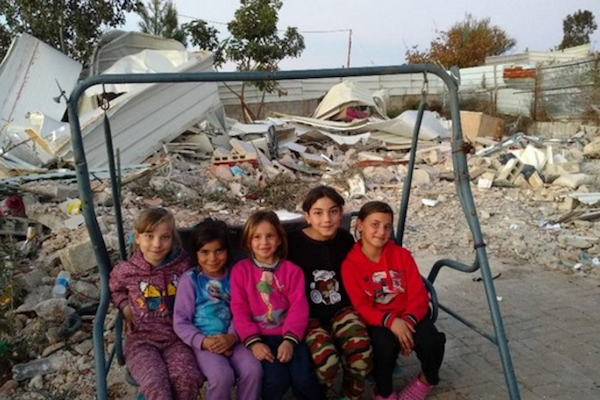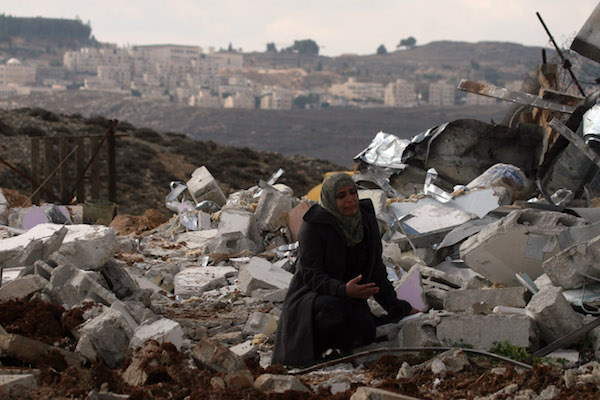Ever since the Rajbi family home was demolished by Israeli authorities two weeks ago, the children have been staying with relatives, while the father sleeps in a tin hut next to the rubble. This is what it looks like when Israel turns its Palestinians into criminals against their own will.

The path to the Rajbi family home in East Jerusalem’s Beit Hanina neighborhood, or what was their home until two weeks ago, is difficult to find, even with the help of navigation apps such as Waze. After driving off the main road, the half-paved alleyways blend into one another in a maze of dirt tracks. Three of them bear the exact same name. After a few attempts to find the house, Samir, brother of Issam Rajbi whose former home we are looking for, comes to our rescue. In East Jerusalem, this is not an especially effective milestone; the dirt mounds and remains of demolished homes are pile up on the way, every few hundred meters.
According to the Israeli organization Ir Amim, which tracks the goings on in East Jerusalem, there has been an increase in home demolitions in East Jerusalem since mid-2015. 2016 saw a record high of 123 housing units demolished. Since the beginning of 2017, 96 residential units and 59 other structures have been destroyed. For the sake of comparison, the yearly average preceding 2016 hovered at around 50 per year.
Around two weeks ago, on November 22, it was the Rajbi family’s turn. The family is comprised of a mother, a father, and eight children between the ages of 6 and 21. Like many of East Jerusalem’s Palestinians, the Rajbis are trapped by a lack of planning, preventing them any opportunity to legally build their home on their own land. This turns them into criminals against their own will.
“I have been submitting requests to delay the demolition since 2010,” says Issam. “The demolition order applied to the 30 meters around the house. I told them several times that I would demolish those 30 meters by myself. They told me ‘don’t do anything.’ Last Wednesday they came unannounced and began demolishing. I told their work manager that the order only applied to the 30 meters. He responded, ‘don’t even talk to me, I know what to do,’ and destroyed the entire house.”
Who will rent to a family of eight?
Issam, a 43-year-old construction worker, says he developed heart problems after the demolition. We are sitting on plastic chairs on the stone steps adjacent to the ruins. He despondently shows us document after document, which he keeps meticulously. Request upon request, rejection upon rejection, announcements, warnings, fines, and even a photo of his heart that was taken at the hospital after he saw his home destroyed before his very eyes.
“My wife stood by and cried, she begged them to at least let us remove a few things from the house, but they did not allow it. They demolished the entire home with all of our lives inside. I will die before I will be able to get back everything we had.” Rajbi is not exaggerating — among the ruins one can see the refrigerator, the laundry machine, and what used to be the children’s room: broken closets, ripped clothes, the head of a doll. This is how the Rajbi children found their home when they returned from school that day.

I ask Issam whether the children whether they knew that their home was in such danger. “I said nothing to them,” he responds. “After all, every year I was able to delay the demolition, I thought that I would eventually be able to save the home. And I didn’t want them to live in constant fear that one day they would come home and it would be gone.”
The children are currently living with his brothers in the neighborhood. Issam continues to sleep under a tin roof near the remains of his home. “If it were summer, we would all be sleeping out here,” he says. In the afternoon, when the children return from school, they walk around the ruins with their father. “I cannot find an apartment to rent anywhere. No one is willing to rent to a family with eight children. No one.” Samir, Issam’s younger brother, agrees. “Since they destroyed their home, I went through all the neighborhoods to find an apartment. The moment they hear ‘eight children’ they slam the door.
I try to comprehend how such small children can continue with their lives. “Every day I take them to play at the playground in Pisgat Ze’ev,” says Samir. “There are not enough beds in our homes, so in the meantime they sleep on the floor at our place and at other brothers’ homes. Sometimes I find them crying in their room.”
“The only clothes they have were the ones on their back that day and some clothing they took from my brothers,” Issam says. “We do laundry every day so that they can wear them again tomorrow. At school I asked that they be given new books. They have yet to receive them.”
‘We have delayed everything for a year’
Issam’s children, five girls and three boys, are happy and curious. When I ask them what they miss the most, they smile with embarrassment. “Call Duaa,” Issam calls to them. “She is the least shy,” he says, smiling. Seven-year-old Duaa approaches and begins listing every thing she lost: colored pencils, her new clothes, the doll. Slowly her brothers and sisters chime in: they lost their phone, schoolbooks, toys, new school uniforms. The olive, apple, and lemon trees that stood in the yard were also destroyed in the melee. Later, as we stand at the gate outside the home, six-year-old Nour walks up to me and says in a near-whisper: “The bicycle, too. I had a bicycle there.”
“Now we need to clean this up,” says Issam as he looks despairingly at the rubble. “Many good people say they want to help me rebuild 40-50 meters, so that we have where to sit with our children. But I am afraid they will demolish it all over again.” Night falls slowly, and in the background one can clearly see cranes working tirelessly at the nearby settlements. “There they are building 1,000 homes without a problem. Here they destroy a home because of 30 meters.”
We are silent as Issam pours us black coffee from a thermos. What can you say to someone whose life work has been turned into dust in just a few moments. Suddenly he rises, walks over to the sage bush that survived the demolition, and asks one of his children to bring him a bag. He fills it fragrant salvia branches, two of them are attached to a root, so that I can plant my own at home.
“My oldest son was supposed to get married in a month,” he says, “but we have delayed everything for a year.” His head tilts once again toward the demolished home. “Here is my living room. Here is the bedroom. In 10 minutes they destroyed everything I built my entire life.”
Before we part ways, I learn that one of Issam’s brothers, who is currently housing some of the children, is facing a similar threat: a demolition order for another month. What will happen, I ask almost rhetorically. “Who knows,” he smiles and accompanies us to the gate.
This article was first published in Hebrew on Local Call. Read it here.



